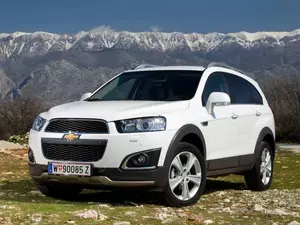
| Vehicle | Precise engine size | Difference from world average | Engine size to consumption ratio | Horsepower from 1 L | Engine size to 100 kg of weight |
|---|---|---|---|---|---|
| 2.4 Ecotec |
2.38 L (2384 cc) |
1.6% bigger | - | 70 hp from 1 L | - |
| 2.2 VCDi 16V |
2.23 L (2231 cc) |
4.9% smaller | 74 cc to 1 mpg | 83 hp from 1 L | - |
| 3.0 V6 |
3 L (2997 cc) |
27.7% bigger | - | 86 hp from 1 L | - |
| Vehicle | 2.4 Ecotec |
|---|---|
| Precise engine size | 2.38 L (2384 cc) |
| Difference from world average | 1.6 bigger |
| Engine size to consumption ratio | - |
| Horsepower from 1 L | 70 hp from 1 L |
| Engine size to 100 kg of weight | - |
| Vehicle | 2.2 VCDi 16V |
| Precise engine size | 2.23 L (2231 cc) |
| Difference from world average | 4.9 smaller |
| Engine size to consumption ratio | 74 cc to 1 mpg |
| Horsepower from 1 L | 83 hp from 1 L |
| Engine size to 100 kg of weight | - |
| Vehicle | 3.0 V6 |
| Precise engine size | 3 L (2997 cc) |
| Difference from world average | 27.7 bigger |
| Engine size to consumption ratio | - |
| Horsepower from 1 L | 86 hp from 1 L |
| Engine size to 100 kg of weight | - |

| Vehicle | Precise engine size | Difference from world average | Engine size to consumption ratio | Horsepower from 1 L | Engine size to 100 kg of weight |
|---|---|---|---|---|---|
| 2.4 Ecotec |
2.38 L (2384 cc) |
1.6% bigger | 95 cc to 1 mpg | 70 hp from 1 L | 132 cc to 100 kg |
| 2.2 VCDi 16V |
2.23 L (2231 cc) |
4.9% smaller | 74 cc to 1 mpg | 83 hp from 1 L | 117 cc to 100 kg |
| 3.0 V6 |
3 L (2997 cc) |
27.7% bigger | 136 cc to 1 mpg | 86 hp from 1 L | 167 cc to 100 kg |
| Sport 2.4 |
2.38 L (2384 cc) |
1.6% bigger | - | 76 hp from 1 L | 140 cc to 100 kg |
| Vehicle | 2.4 Ecotec |
|---|---|
| Precise engine size | 2.38 L (2384 cc) |
| Difference from world average | 1.6 bigger |
| Engine size to consumption ratio | 95 cc to 1 mpg |
| Horsepower from 1 L | 70 hp from 1 L |
| Engine size to 100 kg of weight | 132 cc to 100 kg |
| Vehicle | 2.2 VCDi 16V |
| Precise engine size | 2.23 L (2231 cc) |
| Difference from world average | 4.9 smaller |
| Engine size to consumption ratio | 74 cc to 1 mpg |
| Horsepower from 1 L | 83 hp from 1 L |
| Engine size to 100 kg of weight | 117 cc to 100 kg |
| Vehicle | 3.0 V6 |
| Precise engine size | 3 L (2997 cc) |
| Difference from world average | 27.7 bigger |
| Engine size to consumption ratio | 136 cc to 1 mpg |
| Horsepower from 1 L | 86 hp from 1 L |
| Engine size to 100 kg of weight | 167 cc to 100 kg |
| Vehicle | Sport 2.4 |
| Precise engine size | 2.38 L (2384 cc) |
| Difference from world average | 1.6 bigger |
| Engine size to consumption ratio | - |
| Horsepower from 1 L | 76 hp from 1 L |
| Engine size to 100 kg of weight | 140 cc to 100 kg |

| Vehicle | Precise engine size | Difference from world average | Engine size to consumption ratio | Horsepower from 1 L | Engine size to 100 kg of weight |
|---|---|---|---|---|---|
| 2.2 VCDi 16V |
2.23 L (2231 cc) |
4.9% smaller | 51 cc to 1 mpg | 73 hp from 1 L | 124 cc to 100 kg |
| 2.4 Ecotec |
2.38 L (2384 cc) |
1.6% bigger | 92 cc to 1 mpg | 70 hp from 1 L | 140 cc to 100 kg |
| 3.0 V6 |
3 L (2997 cc) |
27.7% bigger | 136 cc to 1 mpg | 86 hp from 1 L | 167 cc to 100 kg |
| 2.2 VCDi |
2.23 L (2231 cc) |
4.9% smaller | 60 cc to 1 mpg | 83 hp from 1 L | 117 cc to 100 kg |
| Vehicle | 2.2 VCDi 16V |
|---|---|
| Precise engine size | 2.23 L (2231 cc) |
| Difference from world average | 4.9 smaller |
| Engine size to consumption ratio | 51 cc to 1 mpg |
| Horsepower from 1 L | 73 hp from 1 L |
| Engine size to 100 kg of weight | 124 cc to 100 kg |
| Vehicle | 2.4 Ecotec |
| Precise engine size | 2.38 L (2384 cc) |
| Difference from world average | 1.6 bigger |
| Engine size to consumption ratio | 92 cc to 1 mpg |
| Horsepower from 1 L | 70 hp from 1 L |
| Engine size to 100 kg of weight | 140 cc to 100 kg |
| Vehicle | 3.0 V6 |
| Precise engine size | 3 L (2997 cc) |
| Difference from world average | 27.7 bigger |
| Engine size to consumption ratio | 136 cc to 1 mpg |
| Horsepower from 1 L | 86 hp from 1 L |
| Engine size to 100 kg of weight | 167 cc to 100 kg |
| Vehicle | 2.2 VCDi |
| Precise engine size | 2.23 L (2231 cc) |
| Difference from world average | 4.9 smaller |
| Engine size to consumption ratio | 60 cc to 1 mpg |
| Horsepower from 1 L | 83 hp from 1 L |
| Engine size to 100 kg of weight | 117 cc to 100 kg |

| Vehicle | Precise engine size | Difference from world average | Engine size to consumption ratio | Horsepower from 1 L | Engine size to 100 kg of weight |
|---|---|---|---|---|---|
| 2.4i 16V |
2.41 L (2405 cc) |
2.5% bigger | 93 cc to 1 mpg | 56 hp from 1 L | 141 cc to 100 kg |
| 2.0 VCDi |
1.99 L (1991 cc) |
15.1% smaller | 62 cc to 1 mpg | 75 hp from 1 L | 111 cc to 100 kg |
| 3.2i V6 24V |
3.2 L (3195 cc) |
36.2% bigger | 160 cc to 1 mpg | 72 hp from 1 L | 178 cc to 100 kg |
| Vehicle | 2.4i 16V |
|---|---|
| Precise engine size | 2.41 L (2405 cc) |
| Difference from world average | 2.5 bigger |
| Engine size to consumption ratio | 93 cc to 1 mpg |
| Horsepower from 1 L | 56 hp from 1 L |
| Engine size to 100 kg of weight | 141 cc to 100 kg |
| Vehicle | 2.0 VCDi |
| Precise engine size | 1.99 L (1991 cc) |
| Difference from world average | 15.1 smaller |
| Engine size to consumption ratio | 62 cc to 1 mpg |
| Horsepower from 1 L | 75 hp from 1 L |
| Engine size to 100 kg of weight | 111 cc to 100 kg |
| Vehicle | 3.2i V6 24V |
| Precise engine size | 3.2 L (3195 cc) |
| Difference from world average | 36.2 bigger |
| Engine size to consumption ratio | 160 cc to 1 mpg |
| Horsepower from 1 L | 72 hp from 1 L |
| Engine size to 100 kg of weight | 178 cc to 100 kg |